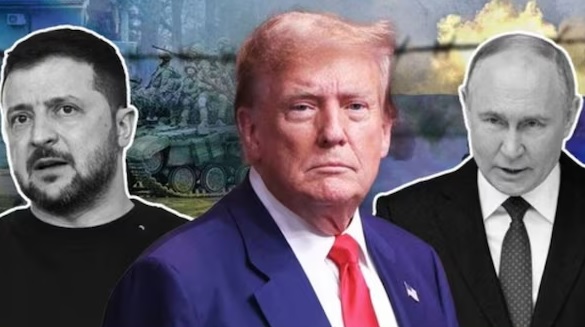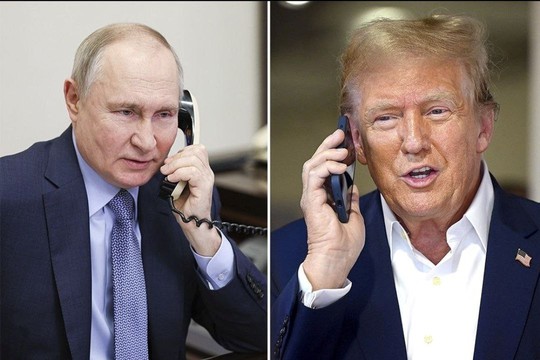Photo: TASS and AP
“The root causes of the conflict.” These were startling words from a man purportedly on the path to peace.
Unbothered, taking this most consequential of calls at a music school on the Sochi coast, the Kremlin head Vladimir Putin has returned to the start – to his narrative about this war of choice being sparked by NATO expanding too fast, CNN writes.
“It is not our war,” said Vice President JD Vance earlier. Reprising his role as the harbinger of very bad news for European security, Vance held out again this remarkable non-threat: that the United States might pull out of the war – presumably from both diplomacy and aid to Ukraine – unless Russia takes steps toward a peace deal it adamantly does not want. Washington backing off is exactly what Russia yearns for, and to earn this dream outcome, it seems Putin has to do absolutely nothing, bar continue to wage a brutal war.
Moments after the call, Trump already sounded like a man stepping back from the fray. Five days earlier he had been the febrile intermediary, the peacemaker willing to bridge the enmity between Putin and Ukraine’s Volodymyr Zelensky for a meeting in Turkey. But after his Monday call with Putin, he simply said Ukraine and Russia must talk directly, “as only they can.” He even passed the task to the home of the new American Pope, the Vatican, as a possible venue. The United States may not be out of the process entirely, but it talks like it wants someone else to lead it.
For the best part of three years of war, Russia’s state media has been lecturing its audience they are not only in conflict with Ukraine, but also with all of NATO, including the United States. The presidency of Trump has created a small window in which the Kremlin might talk its way into a better position, or even alleviate the pain of some Western sanctions. But it does not change the central calculation or message of the Kremlin: this is an existential war, about re-establishing their pre-eminence in their near abroad.
So much pain and loss has been inflicted on the Russian people through staggering war casualties that delivering middling to poor results might significantly limit the longevity of Russia’s leadership. This isn’t a war they can be seen to have lost.
The limits of what the United States can offer Russia at the moment, in terms of leverage, are visible from space. Yes, the US could escalate sanctions, even, as Trump mulled last week, adding “secondary sanctions” against Russia’s financiers, the oil purchasers of India and China. But that would cause another trade-like rift with world powers that Washington has just made good with. The US could alternatively ease sanctions to coax Russia into concessions. But those kid gloves would irk their European allies, and likely falter without Europe’s practical support.
Any further steps to cause Moscow pain would likely mean Trump had gone further to punish Russia than his predecessor Joe Biden did. That is not the MAGA geopolitical gameplan. It would deepen US involvement in a war where there is, frankly, no end in sight, until one side falters, or sees drastic change in political leadership.
Ukraine in 2025 is a bleak prospect. But the central tenet of European policy was the best choice in a world of ghastly options: Moscow could only be forced into reducing its goals if it saw an infinitely united NATO before it. Its economy, reserve wealth, manpower, or hardware might falter – only one needs to for the war machine to stutter. It is bleak, but Europe is left with little choice. Ukraine has no choice at all.
Trump felt he has a choice. His business acumen sees no merit in a long-term investment in a conflict with an enemy you’d prefer to get along with, the best outcome from which is to return Europe to the peace it knew before. There is no deal to be made here. Putin is not buying anything. Trump has nothing to sell, bar the United States’ backing for its traditional allies.
American leadership has for decades been built around something other than good, small deals. Its benevolence toward allies, vast soft power, and military hegemony, has left it the biggest economy on earth, with an undefeatable currency – itself a very good and huge deal.
But Trump sees America’s role as smaller. This may be the moment Trump finally understood Putin as someone who really doesn’t seek his approval or allegiance, and stepped back. If it is, the United States too has stepped back from decades of calling the shots, admitted the limits of its focus and power.
The last 10 days have been a vivid reminder of how little Putin really needs POTUS or his approval, CNN stresses.
…CNN is right! Ukraine’s case is the Russian business! Not American. Not European.
 Pic.: firstpost.com
Pic.: firstpost.com
One European official, Bloomberg asked, not to be identified discussing private conversations, said leaders fear that Trump is disengaging from the diplomatic effort. Another said Trump had made it clear he didn’t want to impose more sanctions at this stage and was retreating from his own proposal for a ceasefire. The official added that leaders in Kyiv and elsewhere in Europe disagree with his plan for Russia and Ukraine to talk directly.
By having Moscow and Kyiv negotiate directly on a framework for peace talks before a truce is in place, Trump is essentially allowing Putin to buy time, said another European official familiar with Monday’s discussions. In Istanbul last week, Russian negotiators presented maximalist demands, including international recognition of Moscow’s control of four Ukrainian regions that Putin’s forces don’t fully occupy and restrictions on Kyiv’s military capabilities.
“Today, it feels like we are back into a much longer-term scenario, in which Putin is buying himself and his military more time,” said Kristine Berzina, managing director of the German Marshall Fund’s Geostrategy North program in Washington. “Putin won himself more opportunities, and a ceasefire and a resolution seem ever further away.”
Kremlin spokesman Dmitry Peskov underscored the lack of a hard timeline for a ceasefire. “There is no deadline, and there can’t be one,” he told reporters, according to the state-run Tass news service. “It is clear that everyone wants to do it as quickly as possible, but the devil is in the details.”
Zelenskiy, who’s already on board with Trump’s demand for an immediate ceasefire, spoke to the US leader before and after the Putin call, and said Russia must face stronger sanctions if it doesn’t stop the fighting.
“Ukraine is ready for a full and unconditional ceasefire,” Zelenskiy said on social media Monday evening. “It is important not to dilute this proposal. If the Russians are not ready to stop the killings, there must be stronger sanctions.” He also said that Ukraine was ready for direct negotiations with Russia “in any format that brings results.”
But Trump didn’t seem to agree about the need for more sanctions, while also calling Zelenskiy “not the easiest person to deal with.”
Putin told reporters in Sochi that the call was “frank” and “very useful,” and said the two agreed that Russia would work on a memorandum with Ukraine for a possible future peace treaty. He offered no details, adding his core talking point: “The main thing for us is to eliminate the root causes of this crisis.”
read more in our Telegram-channel https://t.me/The_International_Affairs

 11:33 21.05.2025 •
11:33 21.05.2025 •























